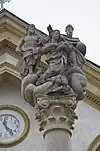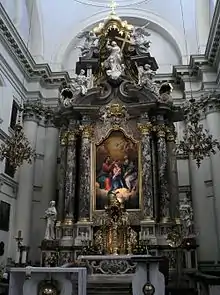
Ursuline Church of the Holy Trinity (Slovene: Uršulinska cerkev svete Trojice), officially Holy Trinity Parish Church in Ljubljana (Župnijska cerkev svete Trojice), also Nun Church (Nunska cerkev), is a parish church in Ljubljana, the capital of Slovenia.[1] It is located at Slovene Street (Slovenska cesta), along the western border of Congress Square. It was built between 1718 and 1726 in the Baroque style.[2]
History
The church was designed by Carlo Martinuzzi, a Friulian architect, and is noted for its extensive altar made of African marble designed by Francesco Robba, who also built the Fountain of the Three Rivers of Carniola which stands on Town Square in Ljubljana.[2] The original bell tower was destroyed in the Ljubljana earthquake of 1895.[2] The current one was built in the 1900s. The staircase in front of the entrance has been partially designed by the architect Jože Plečnik in 1930.[1]
Holy Trinity Column

In front of the Ursuline Church stands the Holy Trinity Column. The originally wooden column stood since 1693 in front of a Discalced Augustinian monastery at Ajdovščina.[3] In 1722, it was replaced with a stone one, made by Luka Mislej, whereas the marble statues have been presumably created by Francesco Robba.[4] In 1834, the stonemason Ignacij Toman made a new pedestal and the original Robba's sculpture was replaced with a replica. The original is now kept by the City Museum of Ljubljana. The column was again renovated after the 1895 Ljubljana earthquake by the stonemason Feliks Toman. It was relocated in front of the Ursuline Church in 1927 upon plans by Plečnik as part of his redesign of Congress Square. Now it forms an axis with the Ursuline Church, the lights at the square and the building of the Slovenian Philharmonics.[5]
Depictions
After in 1991 Slovenia declared independence from Yugoslavia, the Ursuline Church was portrayed on the Slovene 10 tolar banknote. It was in circulation from October 1991 until the introduction of the euro in January 2007.[6]
Gallery
 Interior
Interior Altar
Altar Pulpit
Pulpit
References
- 1 2 "1980: Ljubljana - Cerkev sv. Trojice" [1980: Ljubljan – Holy Trinity Church]. Register nepremične kulturne dediščine [Registry of Immovable Cultural Heritage] (in Slovenian). Ministry of Culture, Republic of Slovenia. Archived from the original on 16 February 2016. Retrieved 29 October 2012.
- 1 2 3 "Ljubljana.info". Archived from the original on 2008-07-24. Retrieved 2008-03-19.
- ↑ Stopar, Ivan; Prelovšek, Damjan (1992). Walks in old Ljubljana: a guide to its culture and history. Marketing 013 ZTP. p. 135.
- ↑ Resman, Blaž (April 2012). "Uršulinska cerkev sv. Trojice" [Ursuline Church of the Holy Trinity]. Pot po baročni Ljubljani, virtualna razstava sakralnih spomenikov [Walk Through the Baroque Ljubljana: the Virtual Exhibition of Sacral Monuments (in Slovenian). Archived from the original on 2013-06-20. Retrieved 2013-06-19.
- ↑ Čopič, Špelca; Prelovšek, Damjan; Žitko, Sonja (1991). Ljubljansko kiparstvo na prostem [Outdoor Sculpture in Ljubljana] (in Slovenian). Ljubljana: Državna založba Slovenije. p. 14. ISBN 86-341-0671-3.
- ↑ Šiška, Marko (January 2012). "Twenty Years of National Currency". Www.ukom.gov.si. Government Communication Office, Republic of Slovenia. Archived from the original on 2013-10-22. Retrieved 2012-05-21.
External links
- Ursuline Church. Holy Trinity Parish, Ljubljana